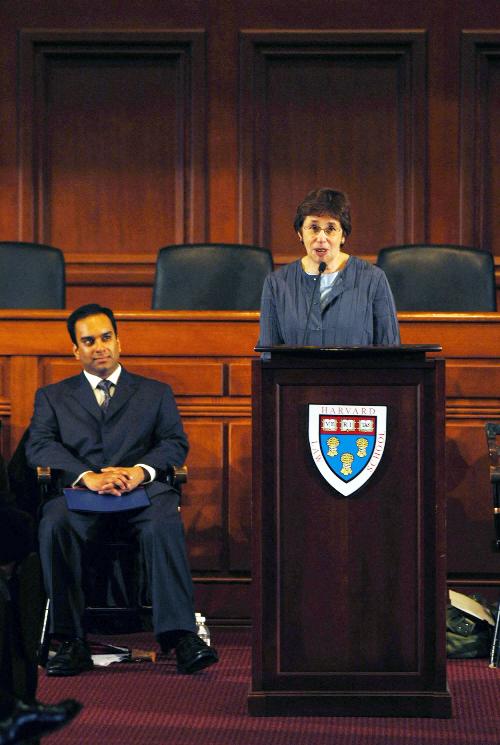
News
Garber Privately Tells Faculty That Harvard Must Rethink Messaging After GOP Victory

News
Cambridge Assistant City Manager to Lead Harvard’s Campus Planning

News
Despite Defunding Threats, Harvard President Praises Former Student Tapped by Trump to Lead NIH

News
Person Found Dead in Allston Apartment After Hours-Long Barricade

News
‘I Am Really Sorry’: Khurana Apologizes for International Student Winter Housing Denials
Law School Warms Up to Greenhouse
Prize-winning journalist recounts '10 things I learned covering the Supreme Court'

For a journalist who has spent the better part of 28 years in the corridors and chambers of the nation’s highest court, Harvard Law School’s (HLS) Ames Courtroom must have been a more comfortable setting than the flooded Holmes field.
Linda J. Greenhouse ’68, a Pulitzer Prize winner, addressed the grads-to-be at the Law School’s Class Day, drawing from her experiences as a reporter covering the Supreme Court for the New York Times.
“I could tell you that rule of law is hanging by a thread stressed by law-free zones like Guantanamo Bay, Congress, or other places,” said Greenhouse to raucous laughter. “I could tell you that the Supreme Court may be our last, best hope, but I’m a journalist who after all are not suppose to have opinions.”
Instead, Greenhouse, who is also a former Crimson editor, instructed the future lawyers—some, as she noted, future Supreme Court law clerks—about the “10 Things I’ve Learned While Covering the Supreme Court.”
Beneath the courtroom’s high-ceiling rafters, graduates, friends and family members in Austin Hall’s overflow seating watched as HLS Dean Elena Kagan praised Greenhouse’s coverage.
“I don’t read the opinions [of Supreme Court justices] anymore,” said Kagan of Greenhouse’s extensive reporting. She called Greenhouse “the greatest court reporter [and] greatest legal journalist there has ever been and ever will be.”
Saying that she had sought advice from Chief Justice John G. Roberts Jr. ’76 before coming, Greenhouse explained some of the simpler truths of the Supreme Court: the Justices don’t always know what their decisions will mean and “eventually all nine Justices will leave the Court. We just don’t know when or in what order.”
Greenhouse described her job as “one of the best jobs in the world” and, citing recent rulings about the constitutionality of racially conscious decisions in public schools, said that “the Court never loses its capacity to surprise.”
Jeffrey E. Jamison, a class marshal, said Greenhouse provided “both insight and wisdom.”
“Since we’re all law school geeks, we found it fantastic,” he said.
The Class Day exercises also included remarks by other class marshals, who spoke about their experiences at the traditionally button-down and competitive law school by remembering lighter moments, such as ice cream parties, “broom ball” games at the ice rink, and one particular professor’s prowess on the basketball court.
Six of the nine members of the Court that Greenhouse covers attended Harvard Law School including Roberts, the recently appointed chief justice.
Responding to Kagan’s early assertion that she no longer needs to read the Court’s opinions because of the thoroughness of her own coverage, Greenhouse told the appreciative crowd, “Read the opinions. I don’t want the responsibility.”
—Staff writer Samuel P. Jacobs can be reached at jacobs@fas.harvard.edu.
Want to keep up with breaking news? Subscribe to our email newsletter.
